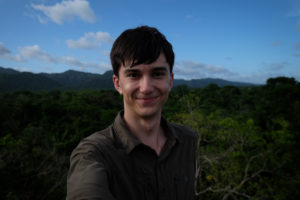Summer Intern Spotlight: Parr McQueen
 Parr McQueen, an undergraduate student at the University of Richmond traveled to Belize with BFREE earlier this year along with thirteen other classmates. The Field Course led by Dr. Amy Treonis and Dr. Kristine Grayson was focused on using experiential field methods to learn how scientists study the natural world.
Parr McQueen, an undergraduate student at the University of Richmond traveled to Belize with BFREE earlier this year along with thirteen other classmates. The Field Course led by Dr. Amy Treonis and Dr. Kristine Grayson was focused on using experiential field methods to learn how scientists study the natural world.
Inspired by his trip and what he learned during his semester-long course, Parr returned to BFREE this summer. For just over a month, Parr spent his time working in the field, collecting data to support his research examining cacao based agroforestry and its impact on the rainforest. When he wasn’t busy taking soil samples, Parr explored the many trails around BFREE snapping incredible photos of the wildlife he discovered.
We are so fortunate to have hosted Parr for the second time this year. We can’t wait to see all of the great things he will accomplish!
My Summer Internship at BFREE
By: Parr McQueen
Earlier this summer I had the fantastic opportunity to stay at the BFREE field station for five weeks as part of the summer internship program. As a current undergraduate student at the University of Richmond, this was a great educational opportunity for me. Doing anything from assisting with the care of the Hickatee turtles to working with school groups, I was able to experience the rainforest more than any week-long field course could offer. This was an incredible experience with too many good memories to write about and has certainly made me grow, providing a stepping stone for future career prospects. In addition to the internship program, I made use of my time in Belize to conduct my own research.
My research examines cacao based agroforestry and its impact on the rainforest. In much of the developing world, forests are being cut down at increasing rates for traditional agriculture. Slash and burn farming is prevalent and it is occurring right up to protected area boundaries, reducing habitat for endangered species and contributing to climate change. Deforestation in the tropics has been estimated to make up 29% of the total emissions from fossil fuels and other sources that cause global warming.
BFREE has an ongoing project to help promote cacao agroforestry, which is a much more sustainable farming method that still provides income for local farmers. This is a way of planting cacao, the raw product to make chocolate, within the established rainforest instead of in a traditional field. Rather than cutting the forest to the ground, smaller plants are thinned out and large trees are left in place. In many studies, this has been shown to preserve biodiversity by providing habitat for avian and mammalian species, but no work at all has been done examining how the microorganisms are affected. With the help of Dr. Amy Treonis, Associate Professor of Biology at the University of Richmond, I am attempting to answer this important question.
While in Belize, I sampled soil from replicate cacao agroforestry farms and the adjacent undisturbed rainforest. Currently, in Richmond, I am in the middle of processing the soils to extract microscopic nematode worms. Nematodes are a commonly studied microorganism and are a good indicator species of soil health. I will be looking at the makeup of the nematode communities present in the soils to get an idea of the health of the soil in the agroforestry systems compared to the health in the undisturbed rainforest. This research is important because we need to know if the cacao agroforestry is impacting the health and biodiversity within the soil. While we can see the colorful birds and cute mammals prospering, we have no idea if the microorganisms in the soil are thriving or not. Healthy soil microorganisms carry out critical nutrient cycling and decomposition processes that are essential to having a fully functioning ecosystem.
Overall I had a wonderful time at the BFREE field station and was able to learn a lot, by fully immersing myself in the day-to-day operations, while at the same time strengthening my own personal research program.
